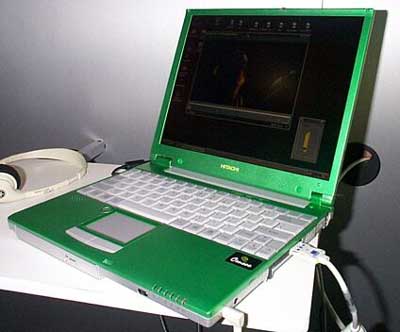Elizabeth Connor van Tom's Hardware Guide is bij de PC Expo op bezoek geweest en heeft daar een verslagje over geschreven. De PC Expo stond in het teken van de PDA's en notebooks, en daar gaat dus ook het grootste gedeelte van het verslag over.
Hieronder een quote van Tom's Hardware Guide over het groeiend aantal uitbreidingsmodules voor PDA's, iets waar ik me persoonlijk wel in kan vinden:
So, now we have expansion modules in form of the SD Card (Palm), Memory Stick (Sony), Springboard (Visor), and Compact Flash (TGRPro). All this gets pretty confusing for consumers, and of course the different technologies are completely incompatible. Haven't these companies learned anything from the past? Proprietary standards are never a good idea. Just image this kind of thing had happened in the PC world. Major PC manufacturers like Compaq, Dell, Gateway and others decided to each use a floppy drive that is incompatible with the drives of other manufacturers. Well, you could not just simply copy a file to a floppy, take it to your friends' house and copy it on his or her machine - unless it is the same brand. Even Apple decided at one point that it would be a good idea for Macs to be able to read discs that had been formatted on a PC... If handheld systems, and that also includes cell phones, MP3 players, and similar devices, all used the same expansion standard, it would be possible to share peripherals among them. What a concept![break]Hieronder een stukje over het stroomgebruik van de Crusoe versus de mobile Pentium III, niet erg verassend blijkt de Crusoe een stukje beter te zijn als de Intel tegenhanger als we door de creative benchmark resulaten heenkijken:[/break]Quite funny. Intel now seems to get slightly nervous about Transmeta, because just a few days before the PC Expo, Intel introduced two special low-power processors for notebooks: a 600 MHz mobile Pentium III, and a 500 MHz mobile Celeron with SpeedStep, Intel's power management technology. According to Intel, the processors consume between 1 and 2 Watts. But as the German computer magazine c't pointed out in their recent issue 14/2000, it all depends on how you actually measure the power consumption. Intel based their measurements on a scenario called 'Average Power', where the processor (maximum power consumption 8.1 Watts at 500 MHz and 1.1 Volts) is in sleep mode for 80 to 95 percent of the time. Transmeta on the other hand lets the Crusoe TM5400 play MP3, and it still only consumes only 1 W (or 1.8 Watts for DVD playback) - including the Northbridge. In case of the Intel processors, the Northbridge alone eats up 2 W (BX chipset). Taken all that into account, Intel's mobile Pentium III should consume about 6 Watts while playing MP3 - about six times as much as Transmeta's Crusoe. Go figure.[break]De Crusoe powered Hitachi Notebook (ik zeg niks over de kleur)....[/break]

